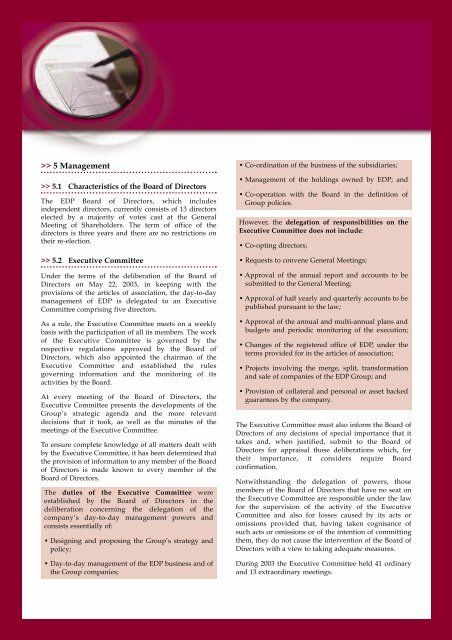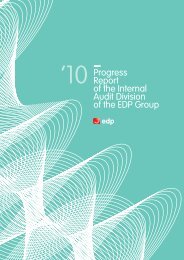business plan for 2004 - EDP
business plan for 2004 - EDP
business plan for 2004 - EDP
Create successful ePaper yourself
Turn your PDF publications into a flip-book with our unique Google optimized e-Paper software.
5 Management<br />
>> 5.1 Characteristics of the Board of Directors<br />
The <strong>EDP</strong> Board of Directors, which includes<br />
independent directors, currently consists of 13 directors<br />
elected by a majority of votes cast at the General<br />
Meeting of Shareholders. The term of office of the<br />
directors is three years and there are no restrictions on<br />
their re-election.<br />
>> 5.2 Executive Committee<br />
Under the terms of the deliberation of the Board of<br />
Directors on May 22, 2003, in keeping with the<br />
provisions of the articles of association, the day-to-day<br />
management of <strong>EDP</strong> is delegated to an Executive<br />
Committee comprising five directors.<br />
As a rule, the Executive Committee meets on a weekly<br />
basis with the participation of all its members. The work<br />
of the Executive Committee is governed by the<br />
respective regulations approved by the Board of<br />
Directors, which also appointed the chairman of the<br />
Executive Committee and established the rules<br />
governing in<strong>for</strong>mation and the monitoring of its<br />
activities by the Board.<br />
At every meeting of the Board of Directors, the<br />
Executive Committee presents the developments of the<br />
Group’s strategic agenda and the more relevant<br />
decisions that it took, as well as the minutes of the<br />
meetings of the Executive Committee.<br />
To ensure complete knowledge of all matters dealt with<br />
by the Executive Committee, it has been determined that<br />
the provision of in<strong>for</strong>mation to any member of the Board<br />
of Directors is made known to every member of the<br />
Board of Directors.<br />
The duties of the Executive Committee were<br />
established by the Board of Directors in the<br />
deliberation concerning the delegation of the<br />
company’s day-to-day management powers and<br />
consists essentially of:<br />
• Designing and proposing the Group’s strategy and<br />
policy;<br />
• Day-to-day management of the <strong>EDP</strong> <strong>business</strong> and of<br />
the Group companies;<br />
• Co-ordination of the <strong>business</strong> of the subsidiaries;<br />
• Management of the holdings owned by <strong>EDP</strong>; and<br />
• Co-operation with the Board in the definition of<br />
Group policies.<br />
However, the delegation of responsibilities on the<br />
Executive Committee does not include:<br />
• Co-opting directors;<br />
• Requests to convene General Meetings;<br />
• Approval of the annual report and accounts to be<br />
submitted to the General Meeting;<br />
• Approval of half yearly and quarterly accounts to be<br />
published pursuant to the law;<br />
• Approval of the annual and multi-annual <strong>plan</strong>s and<br />
budgets and periodic monitoring of the execution;<br />
• Changes of the registered office of <strong>EDP</strong>, under the<br />
terms provided <strong>for</strong> in the articles of association;<br />
• Projects involving the merge, split, trans<strong>for</strong>mation<br />
and sale of companies of the <strong>EDP</strong> Group; and<br />
• Provision of collateral and personal or asset backed<br />
guarantees by the company.<br />
The Executive Committee must also in<strong>for</strong>m the Board of<br />
Directors of any decisions of special importance that it<br />
takes and, when justified, submit to the Board of<br />
Directors <strong>for</strong> appraisal those deliberations which, <strong>for</strong><br />
their importance, it considers require Board<br />
confirmation.<br />
Notwithstanding the delegation of powers, those<br />
members of the Board of Directors that have no seat on<br />
the Executive Committee are responsible under the law<br />
<strong>for</strong> the supervision of the activity of the Executive<br />
Committee and also <strong>for</strong> losses caused by its acts or<br />
omissions provided that, having taken cognisance of<br />
such acts or omissions or of the intention of committing<br />
them, they do not cause the intervention of the Board of<br />
Directors with a view to taking adequate measures.<br />
During 2003 the Executive Committee held 41 ordinary<br />
and 13 extraordinary meetings.

















